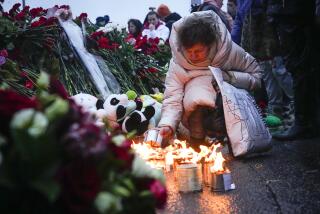Russians Stand Together at Rites for Fallen Countrymen
MOSCOW — In churches scented by crackling beeswax tapers, Russians came together Sunday to grieve for their countrymen who perished one week ago when the struggle for political power in Moscow exploded into open battle.
Alexi II, patriarch of Moscow and all Russia, gave his blessing for a memorial service for all 187 of the dead, whatever their views, in all dioceses of the Russian Orthodox Church.
“Only by asserting peace and concord in our motherland can we continue our way,” the prelate said.
The Orthodox Church had brokered talks between President Boris N. Yeltsin and his foes in Parliament, but they failed to prevent the Oct. 3-4 violence. In a message from Alexi and the Orthodox Holy Synod that was read at the services and that carefully avoided taking sides, the clerics said the blood of the innocent “will remain the indelible mark of Cain on the conscience of those who inspired and carried out the murder of innocent neighbors in spite of the will of God.”
As dusk fell, about 100 people came to stand silently in the nave of the Church of the Assumption on the walled grounds of Moscow’s Novodevichy Convent. Tatyana Stanislavovna, a homemaker in her late 40s, was one of them.
“I think things will be all right,” the pensive woman, her graying brown hair wrapped in a blue kerchief, whispered when asked her evaluation of the past seven days’ events. “What we have been through is just politics.”
One week after giving the orders that brought about the Oct. 4 storming of the country’s Parliament building by the Russian military, Yeltsin was scheduled to fly to Japan today for an official visit.
Few, if any, important results are expected from the trip, which Yeltsin had canceled once and then postponed a second time because of Russia’s political turmoil. However, going this time as scheduled will send a clear message to his own people and the world that Yeltsin is firmly in charge at home.
Japan and Russia are at odds over a territorial dispute that has kept them from signing a peace treaty to legally end World War II hostilities between them. Yeltsin’s visit is not expected to change that state of affairs.
In his Sept. 21 decree dissolving Russia’s Soviet-vintage Parliament and touching off a confrontation that culminated in the assault on Russia’s White House one week ago today, Yeltsin also ordered that elections take place in December for a new bicameral legislature as a way of uprooting the Communist Old Guard.
Nikolai T. Ryabov, chairman of the Central Electoral Commission, said Sunday that preparations for the Dec. 12 balloting are proceeding apace. According to Ryabov, only one of Russia’s constituent republics or administrative subdivisions, Chechenya, has failed to turn in the necessary documents.
Chechenya, a minority homeland on the north slope of the Caucasus, is the only region of Russia to claim full-fledged independence. However, Ryabov blamed the documents’ absence on the “unreliable communications between Grozny (the region’s capital) and Moscow.” That wording seemed designed to give Chechen leaders a chance to reconsider.
Ryabov’s committee also decided how to divvy up the 225 single-member districts in the new legislature’s lower house, the State Duma. Moscow will have 15 representatives; the surrounding Moscow region, 10; St. Petersburg, eight, and most of the rest of Russia’s regions and semiautonomous republics, from five to eight apiece.
The commission approved an estimated budget of up to $160 million in rubles to finance the elections. However, doubts have been voiced, even in Yeltsin’s entourage, that the country’s 107 million voters, who went to the polls in April, will be ready to do so again so soon afterward.
Nevertheless, some of the country’s political movers and shakers were getting in gear for the elections.
On Sunday, Russian TV news said St. Petersburg Mayor Anatoly A. Sobchak had announced the creation of an election bloc called the Movement for Democratic Reforms to be headed by avowed presidential candidate and free-market economist Grigory A. Yavlinsky.
That means reformers may be fielding at least two rival slates, a development that could hurt their chances.
More to Read
Sign up for Essential California
The most important California stories and recommendations in your inbox every morning.
You may occasionally receive promotional content from the Los Angeles Times.










